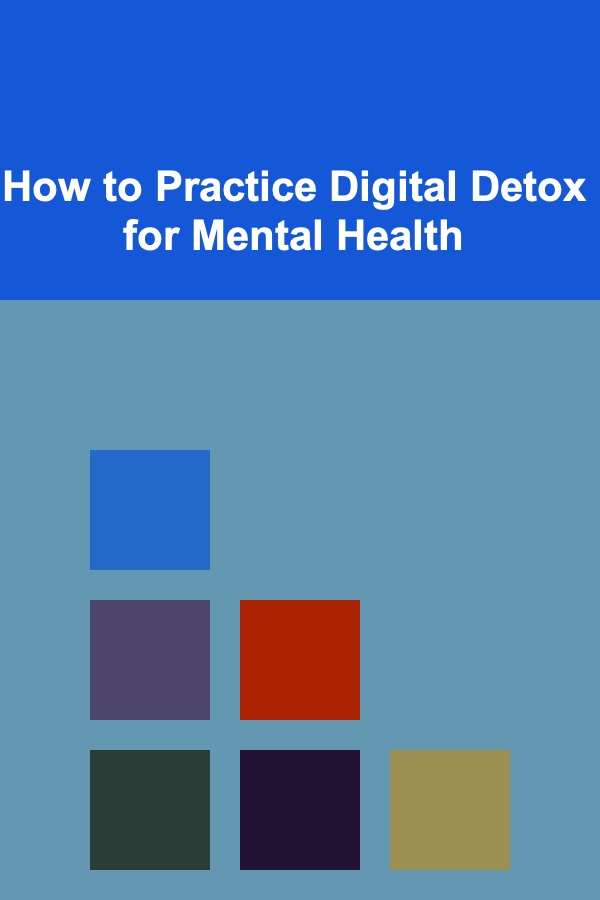
How to Practice Digital Detox for Mental Health
ebook include PDF & Audio bundle (Micro Guide)
$12.99$5.99
Limited Time Offer! Order within the next:

In the digital age, where smartphones, computers, and social media platforms are omnipresent, the line between work, social life, and personal time is increasingly blurred. While technology has undoubtedly brought tremendous convenience, it has also resulted in new challenges, particularly for mental health. The constant influx of information, notifications, and the pressure to remain connected can lead to digital burnout, stress, and anxiety. As a result, more and more individuals are turning to digital detox practices to regain balance and improve their mental well-being.
In this article, we will explore the concept of digital detox, its impact on mental health, and practical strategies for effectively incorporating it into your routine.
Understanding Digital Detox
A digital detox refers to the intentional and temporary disengagement from digital devices and platforms. This may include taking a break from social media, avoiding constant email checking, or stepping away from screen-based activities in general. The idea is to reduce exposure to the overwhelming amount of digital stimuli and give the mind a chance to rest and reset.
The Growing Need for Digital Detox
In recent years, the term "digital detox" has gained popularity as the negative effects of excessive screen time have become more apparent. According to a study by the American Psychological Association, nearly 50% of people report feeling stressed by the constant barrage of digital communication. Social media platforms, in particular, have been linked to increased feelings of inadequacy, anxiety, and depression, as users compare their lives to others or feel pressured to maintain an idealized online persona.
Furthermore, excessive screen time can disrupt sleep patterns, contribute to physical health issues such as eye strain and poor posture, and make it more difficult to concentrate or relax. Digital detox is seen as a solution to combat these negative effects, offering a chance to reconnect with the present moment, focus on self-care, and rejuvenate one's mental health.
The Mental Health Impact of Digital Overload
The impact of digital overload on mental health is both profound and widespread. Here are some key ways in which excessive digital use affects mental well-being:
1. Increased Stress and Anxiety
Constant notifications, the pressure to stay "plugged in," and the anxiety of missing out on important information or updates contribute to heightened stress levels. Research has shown that prolonged exposure to digital devices increases cortisol, the stress hormone, leading to feelings of anxiety and mental exhaustion.
2. Social Comparison and Low Self-Esteem
Social media platforms are often a breeding ground for social comparison. As users scroll through carefully curated posts showcasing the best moments of others' lives, they may feel inadequate, dissatisfied, or insecure about their own lives. Studies have found a significant link between social media use and feelings of low self-esteem, particularly among teenagers and young adults.
3. Sleep Disruption
Excessive screen time, especially before bed, can disrupt sleep patterns. The blue light emitted by screens interferes with the production of melatonin, a hormone that regulates sleep. As a result, individuals may struggle to fall asleep or experience poor-quality sleep, leading to fatigue and reduced cognitive function the following day.
4. Cognitive Fatigue and Decreased Focus
The constant switching between tasks and the overwhelming amount of information we are exposed to digitally can lead to cognitive fatigue. Research suggests that multitasking and information overload can impair memory, reduce the ability to focus, and decrease productivity over time.
5. Digital Addiction
For some individuals, excessive screen time may lead to digital addiction. This occurs when individuals feel an overwhelming compulsion to be online, leading to negative consequences in their personal, professional, and social lives. Digital addiction can exacerbate feelings of isolation, depression, and anxiety.
The Benefits of Digital Detox for Mental Health
Taking a break from digital devices can have numerous benefits for mental health. Here are some of the key advantages of practicing digital detox:
1. Improved Mental Clarity
A digital detox provides an opportunity to disconnect from distractions and regain focus. By reducing the constant influx of information, individuals can experience improved mental clarity, which leads to better decision-making, problem-solving, and cognitive performance.
2. Reduced Stress and Anxiety
Stepping away from digital devices can significantly reduce stress and anxiety levels. When individuals are no longer constantly checking their phones or reacting to every notification, they can experience a sense of calm and relaxation. This, in turn, can lead to improved emotional well-being.
3. Enhanced Sleep Quality
A digital detox, particularly in the evening, can help improve sleep quality. By avoiding screen time before bed, individuals can allow their bodies to produce melatonin naturally, leading to better rest and improved overall health.
4. Reconnection with the Present Moment
Digital detox helps individuals reconnect with the present moment. Without the constant distraction of screens, people can engage more fully in real-life experiences, whether it's spending time with loved ones, enjoying nature, or pursuing hobbies and passions. This reconnection with the present can enhance emotional well-being and increase feelings of joy and fulfillment.
5. Stronger Relationships
By taking a break from digital devices, individuals can strengthen their relationships with others. Without the constant distraction of phones and screens, people can engage in more meaningful, face-to-face conversations and develop deeper connections with those around them.
6. Increased Productivity
Digital detox can also lead to increased productivity. When individuals are no longer interrupted by constant notifications or the temptation to check social media, they can focus more on their work, hobbies, or personal development. As a result, they can accomplish tasks more efficiently and feel a greater sense of achievement.
How to Practice Digital Detox for Mental Health
Practicing a digital detox requires intentional effort and planning. While the idea of disconnecting from the digital world may seem daunting, it can be a rewarding experience that has lasting benefits for your mental well-being. Below are some practical strategies to incorporate digital detox into your routine.
1. Set Boundaries for Screen Time
One of the first steps to a successful digital detox is setting clear boundaries for your screen time. Establish specific times during the day when you will refrain from using digital devices. For example, you could designate the first hour after waking up and the last hour before bed as phone-free times. This can help you start and end your day with a sense of calm and reduce the impact of digital devices on your sleep.
2. Limit Social Media Use
Social media platforms can be major sources of stress, anxiety, and social comparison. To practice digital detox, consider limiting your use of social media. You could set specific times during the day when you allow yourself to check your accounts or uninstall apps that encourage excessive use. Alternatively, consider taking a full break from social media for a week or longer to regain control over your mental health.
3. Practice Mindful Technology Use
Instead of mindlessly scrolling through your phone or checking notifications out of habit, practice mindful technology use. This involves being intentional about how you engage with digital devices and using them for specific purposes. For example, instead of checking social media whenever you're bored, take a moment to reflect on why you're using your phone and whether it's serving your needs in a positive way.
4. Engage in Offline Activities
To replace digital activities, engage in offline activities that promote mental well-being. This could include reading a book, going for a walk in nature, practicing yoga, or pursuing a creative hobby like painting or playing an instrument. By immersing yourself in activities that don't require screens, you can reconnect with yourself and reduce stress.
5. Create Phone-Free Zones
Designate certain areas in your home as phone-free zones. For example, the dining table or the bedroom can be places where digital devices are not allowed. This can help foster more meaningful connections with family members, improve your sleep, and create a space where you can truly relax.
6. Try a Digital Detox Retreat
If you're looking for a more immersive experience, consider attending a digital detox retreat. These retreats typically involve spending several days or weeks in a location where digital devices are restricted or prohibited. During this time, participants engage in mindfulness practices, nature walks, and other activities that promote mental and emotional well-being.
7. Turn Off Notifications
Constant notifications can be a major source of stress and distraction. To reduce the impact of digital devices, turn off non-essential notifications. You can also use "Do Not Disturb" modes during specific hours to ensure that you are not interrupted by digital distractions when you're focusing on work, relaxation, or socializing with others.
8. Establish Technology-Free Times
In addition to setting boundaries for screen time, consider creating technology-free times throughout the week. For example, you might designate Sunday afternoons as a time for offline activities with friends and family. By making these times sacred, you give yourself permission to disconnect and focus on activities that nurture your mental health.
9. Monitor Your Digital Habits
To practice digital detox effectively, it's important to monitor your digital habits. Keep track of how much time you're spending on screens, the types of activities you're engaging in, and how you feel afterward. This can help you identify patterns and areas where you can make improvements, such as reducing time spent on social media or avoiding late-night screen use.
Conclusion
In an age of constant connectivity, practicing a digital detox is more important than ever for maintaining mental health. By intentionally reducing screen time, setting boundaries, and engaging in offline activities, you can combat the negative effects of digital overload and improve your overall well-being. Digital detox is not about completely abandoning technology, but about creating a healthier relationship with it---one that allows you to feel more present, connected, and mentally refreshed.
Incorporating digital detox into your routine can lead to reduced stress, improved sleep, enhanced focus, and stronger relationships. By taking the time to disconnect and recharge, you'll not only improve your mental health but also gain a greater appreciation for the world around you. So, take a break, unplug, and allow yourself the space to recharge---your mind will thank you.

Beginner Guide: The Fundamentals of Digital Marketing
Read More
How to Clean Your Home Using Natural and Eco-Friendly Products
Read More
How to Store Your Fitness Equipment in a Way That Saves Space
Read More
How to Use Tax Preparation to Make Money
Read More
How to Write About Complex Topics Simply
Read More
How To Critique a Movie's Make-up and Hairstyling
Read MoreOther Products

Beginner Guide: The Fundamentals of Digital Marketing
Read More
How to Clean Your Home Using Natural and Eco-Friendly Products
Read More
How to Store Your Fitness Equipment in a Way That Saves Space
Read More
How to Use Tax Preparation to Make Money
Read More
How to Write About Complex Topics Simply
Read More